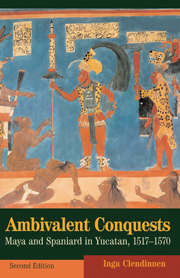Book contents
- Frontmatter
- Contents
- List of illustrations
- Preface to the second edition
- Preface to the first edition
- Acknowledgments
- Map I Yucatan in the conquest period
- Part I Spaniards
- 1 Explorers
- 2 Conquerors
- 3 Settlers
- 4 Missionaries
- 5 Conflict
- 6 Crisis
- 7 Attrition
- 8 Retrospections
- Epilogue: The hall of mirrors
- Part II Indians
- Epilogue: Confusion of tongues
- Appendix: A sampler of documents
- Glossary of Spanish and Maya terms
- Notes
- Select bibliography
- Index
8 - Retrospections
Published online by Cambridge University Press: 05 October 2013
- Frontmatter
- Contents
- List of illustrations
- Preface to the second edition
- Preface to the first edition
- Acknowledgments
- Map I Yucatan in the conquest period
- Part I Spaniards
- 1 Explorers
- 2 Conquerors
- 3 Settlers
- 4 Missionaries
- 5 Conflict
- 6 Crisis
- 7 Attrition
- 8 Retrospections
- Epilogue: The hall of mirrors
- Part II Indians
- Epilogue: Confusion of tongues
- Appendix: A sampler of documents
- Glossary of Spanish and Maya terms
- Notes
- Select bibliography
- Index
Summary
It is worth taking some time over Landa and his Franciscans, to see how they had come to make a world in which they could act with so strong a sense of the necessity of their actions. The group was not large – those friars made uncomfortable by Landa's leadership and his vision of things had already left the peninsula – but individual psychologising cannot explain its cohesiveness and its terrible forward momentum. What was it, then, in the shared experience of the Yucatan Franciscans which made such concerted action possible, and continued to power so formidable an engine of conviction?
The classic study of the Mexican missionary enterprise is entitled The Spiritual Conquest of Mexico. It is a fine title, catching the military metaphor which mediated the experience of that campaign. In the peninsula too the friars had come to conquer the land; to map and order it in the creation of their ‘Yucatan’, a very different place from the ‘Yucatan’ imagined by the lay settlers. I have already discussed how the opposition between Franciscan values and those of their lay compatriots had sharpened dangerously in the New World. These missionaries were not genial towards human frailties. The way of life they celebrated transcended and rebuked ordinary human impulses. Those who lived by the Rule did so in the sure knowledge that the way to virtue lay through the defiance of natural instincts, the more systematic and vigorous the defiance the better.
- Type
- Chapter
- Information
- Ambivalent ConquestsMaya and Spaniard in Yucatan, 1517–1570, pp. 112 - 126Publisher: Cambridge University PressPrint publication year: 2003
- 1
- Cited by

